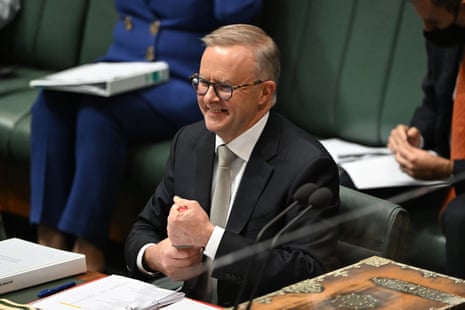Supporters of Australia’s coal export industry have been arguing for the past decade that global greenhouse gas emissions would go up if overseas customers had to source coal from another country.
The rationale is that Australia’s coal exports are higher quality and cause fewer emissions.
Alongside the industry itself, those who have shot this coal-tipped rhetorical arrow include former prime ministers Tony Abbott, Malcolm Turnbull and Scott Morrison, as well as Queensland Nationals senator Matt Canavan.
This week the prime minister, Anthony Albanese, joined them.
In interviews with the Australian and the ABC, Albanese was asked about calls to scale back coal exports.
“What you would see is a replacement with coal from other countries that’s likely to produce higher emissions because of the quality of our product,” he told the ABC’s 7.30 on Wednesday.
The Albanese government this week put a bill before parliament to legislate its 2030 emissions reductions target of 43% based on 2005 levels. Enshrining the target into law will help “end the climate wars”, Albanese has promised.
But choosing to repeat a pro-coal talking point that’s been fired like a missile during those wars seems at odds with that promise.
“It’s a meme and it’s disappointing and disturbing that the Albanese government has picked this up,” says Bill Hare, chief executive of Climate Analytics.
“It’s an argument that’s been pushed by the coal industry for as long as I can remember. When it comes down to CO2 emissions it has never had much credibility.”
But is there any truth to the claim?
“No. It’s an old myth,” Hare says. “The savings would be very small and if there was data it would be difficult to measure.”
The Minerals Council of Australia says the average energy content of coal exported from Australia is among the highest of competing international suppliers, and has less sulphur. Higher energy content generally means less CO2 emissions when it’s burned in a power station.
But in a report on the properties of exported thermal coal, the minerals council also says emissions “vary with both the technology used and the coal properties”. While CO2 emissions can be calculated, the report says the data “is unavailable for all the international coals reviewed in this paper”.
According to a report from Whitehaven Coal, which says the company exports “high-quality coal”, the difference in burning its coal in a power station compared to burning coal from Korea or China is about 4%.
What’s rarely discussed is that emissions from coal exports don’t only occur in the country where the coal is burned. Building new mines and expanding old ones will also see methane emissions rise.
Analysts have warned Australia’s coal mines could be leaking twice as much methane as is reported. Emissions of that potent greenhouse gas are not considered when the industry’s promoters talk about CO2 emissions from burning coal.
But finding theoretical “savings” in emissions from promoting the “qualities” of Australian coal sent overseas is just fiddling in the margins, if those savings even occur.
If the world is to reach its climate goals, the solution is not to substitute one lump of coal for another, but to burn much less of the stuff in the first place.
Hare says continuing to justify global supply of coal at scale will only keep prices for the commodity low in the long term, slowing the transition to renewable energy.
“By putting more coal on the market, we block ourselves from the opportunities in the transition to green energy.”
Carbon neutral petrol?
Ampol, the filling station formerly known as Caltex, has announced it is now offering “carbon neutral” petrol and diesel to business customers.
The climate crisis is largely a creation of fossil fuels, so to claim that burning some of them in a vehicle can be “carbon neutral” has a very oxymoronic feel to it.
Ampol has already bought and retired as many carbon offsets as it thinks it will need (84,317 tonnes of CO2 equivalent) to cover the “sourcing, refining, distribution, retailing and consumption” of the fuels.
Less than half the offsets are Australian projects, with the rest including reforestation in China, landfill gas in Turkey and a coastal conservation project in Guatemala.
But there’s a general rule in decarbonisation that offsets are only used to cut your emissions as a last resort. So if you were a company worried about your transport emissions, you would take all other steps first, such as switching to electric vehicles, before buying offsets.
So is this an appropriate use of offsets?
“In a word, no,” says Polly Hemming, an advisor on climate and energy thinktank the Australia Institute.
“Ampol is a case study in the way carbon offsets are being used to delay decarbonisation.
“Offsets don’t reduce emissions. At best they maintain the status quo. At their worst they’re part of a suite of PR tools to justify ongoing production and expansion of fossil fuels.”

Dr Megan Evans, a conservation policy expert at UNSW Canberra, says most of the Australian offsets bought by Ampol fall under a category known as “human-induced regeneration”.
This category is under intense scrutiny with claims by a whistleblower that many of the carbon credits generated by them did not represent actual emissions cuts – claims rejected by the government’s Clean Energy Regulator, but that will be scrutinised in a review led by former Australian chief scientist Ian Chubb.
Evans says four of the Australian carbon offset projects used by Ampol – representing about a third of all the emissions – were questionable.
“Offsets are meant to provide a price signal that helps to change behaviour and incentivise a switch to a less damaging alternative. I can’t see this playing out with ‘carbon neutral’ petrol.”
She says carbon neutral fuel could actually “delay uptake of more meaningful and effective actions, such as switching to an EV”.
Ampol’s “carbon neutral” fuel has been accredited by the government’s Climate Active program, which is meant to drive voluntary actions to cut emissions.
In a statement, Ampol said the carbon neutral fuel was “one part of our future energy strategy” to decarbonise its own operations and provide “lower emissions energy solutions for our customers”.
“Ampol went through a comprehensive due diligence process to ensure we invest in high-integrity projects that adhere to stringent standards of social and environmental performance, public transparency, and legal accountability.
“We have sourced our carbon credits through a third party where all projects are measured, reviewed, and audited throughout the project lifecycle. Current offset projects are outlined in our public disclosure statements.”
Ampol said it welcomed the Chubb-led review of offsets.
The company would not say how much extra customers would pay for the fuel, but said: “Carbon neutral fuel is a short-term solution for customers looking to offset emissions in areas where lower emissions energy solutions are not yet available.”
The statement said the company was investing $150m in Australia and New Zealand in decarbonisation projects and would install EV charging points at 120 locations by late 2023.
The government’s Climate Active program that has accredited Ampol’s fuel has a guide setting out the principles of using offsets.
It says products looking to become carbon neutral “can use eligible offset units to compensate for emissions that cannot be completely reduced through energy efficiency, the procurement of renewable energy or supply chain management”.
Temperature Check asked Climate Active how accrediting Ampol’s fuel was consistent with these principles.
A statement from the Department of Climate Change, Energy, the Environment and Water said businesses needed to report annually to maintain certification for products.
Ampol had gone through “the same rigorous process required of all members seeking a carbon neutral claim” and the program’s standards were reviewed regularly “to ensure its integrity and that it remains aligned with best practice.”
The statement said Ampol had an emissions reduction strategy to reach net zero by 2040 and targets to cut operational emissions for 2025 and 2030.

